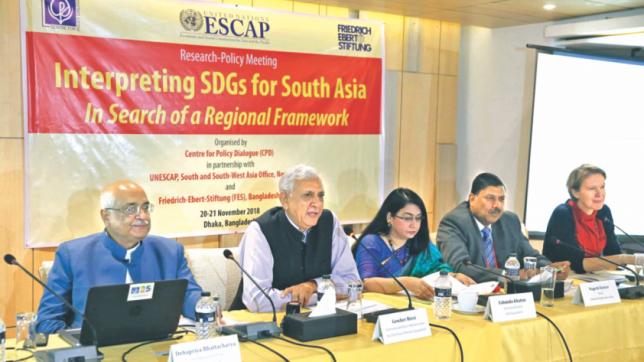Saarc not helping SDGs: CPD

The South Asian Association for Regional Cooperation (Saarc) cannot play an effective role in helping nations attain sustainable development goals (SDGs) due to lack of intergovernmental cooperation, said the Centre for Policy Dialogue (CPD) yesterday.
“It is in a state of paralysis,” said Debapriya Bhattacharya, distinguished fellow of CPD, while presenting a paper titled 'Interpreting SDGs for South Asia: in search of a regional framework'.
The SDGs have created scope for poverty reduction, employment generation and human development, but Saarc is not helping in materialising the opportunities.
“The other regions are putting in a structure to support SDG implementation, whereas in SAARC the progress remains sluggish,” he said at the event organised by the CPD at the capital's Hotel Golden Tulip - The Grandmark.
Given its inability to collectively promote the Millennium Development Goals (MDGs) in the region and the indefinite postponement of SAARC Summit since 2016, any intergovernmental move in the region concerning SDG will be stalled.
South Asian nations can focus on the development of productive capacity, structural transformation and decreasing inequality.
“Trans-border trade and connectivity in the region is very important in this regard,” he said, adding that a pro-people new system is required to activate the forum.
The new system or institute will fulfil the aspirations of the people and for this reason new knowledge and review will be required, he said.
“This new knowledge and assessment regarding the regional forum should be forwarded to the policymakers so that they can take effective initiatives.” Compared to the global average South Asia is lagging behind in terms of major economic indicators, especially those related to international trade and structural transformation. He also suggested making effective other regional forums such as Bangladesh-China-India-Myanmar Forum for Regional Cooperation (BCIM), Bay of Bengal Initiative for Multi-Sectoral Technical and Economic Cooperation (BIMSTEC) and THE Belt Road Initiative (BRI).
Every goal, every target and every outcome of the SDGs is dependent on the ability of the government agencies to work collaboratively, said Gowher Rizvi, international affairs advisor to the prime minister.
“This is something extremely alien to the government. We are very comfortable working in our own silos and there are no horizontal connections,” he added.
M Syeduzzaman, a former finance minister, suggested for formulation of policy for bilateral and multilateral cooperation for trade and commerce, and extract maximum benefit for the region.
Farooq Sobhan, president and chief executive officer of Bangladesh Enterprise Institute, stressed on the need for bilateral relation between governments and also with non-government organisations and think-thanks for attaining the highest level of benefit for the region.
Asif Ibrahim, a former president of Dhaka Chamber of Commerce and Industry (DCCI), thinks the SAARC Chamber of Commerce and Industry can play a role in SDG implementation by exchanging the best practice of private sector. “The private sector's contribution is very important in attaining the SDGs,” he added.
Sonam Tobden Rabgye, head of mission of Bhutan, Aishath Shaan Shakir, head of mission of Maldives, spoke among others.
